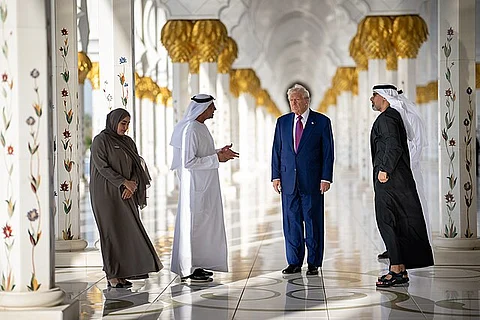

President Donald Trump concluded his tour of the Gulf in Abu Dhabi this week with a series of landmark economic and geopolitical announcements, headlined by a new UAE commitment to raise energy investments in the U.S. to $440 billion by 2035.
The Abu Dhabi National Oil Company (ADNOC), under the leadership of CEO Sultan Al Jaber, confirmed plans to collaborate with Exxon Mobil and Occidental Petroleum. The deal will substantially expand UAE energy sector investments across American oil, gas, and renewables.
In addition, the UAE marked the completion of a $60 billion oil, gas, and green energy infrastructure project and signed a $14.5 billion deal with Boeing for 28 new aircraft for Etihad Airways, further deepening trade ties.
As part of a broader UAE-U.S. Agreement for Cooperation, the Biden administration approved the export of advanced AI semiconductors to Abu Dhabi, which will be administered via U.S.-operated data centers to safeguard American national security interests.
The move supports the UAE’s ambition to become a global leader in artificial intelligence, while keeping Washington strategically embedded in Abu Dhabi’s development plans, which also involve significant Chinese partnerships—Beijing remains the UAE's largest trading partner.
Another headline from Trump’s trip was the $800 million memorandum of understanding signed by DP World to develop Tartous Port in Syria, following the U.S. decision to lift sanctions on Damascus. Although the deal notably did not involve consultations with Israel, Trump urged Syria’s interim president Ahmed al-Sharaa to normalize relations with Israel, echoing Saudi Arabia’s push to stabilize the region.
Trump also confirmed that Iran had received a new U.S. proposal for a potential nuclear agreement. While he did not offer specific details, he warned Tehran to act swiftly: “Everybody warned Iran... something bad could happen.” The remarks suggest that a diplomatic breakthrough could be near, but the administration remains cautious, emphasizing that security cooperation with Israel and the Gulf states remains a top priority.
Trump’s latest diplomatic mission to the Gulf cements a major economic, energy, and technological alliance with the UAE while positioning the U.S. as a key player in regional reconstruction and diplomacy, from Syria to Iran. However, Israel’s exclusion from the Syria port discussions and the fragile status of Iran negotiations point to unresolved regional tensions, even amid growing American engagement.